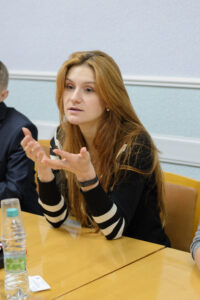Friendship with Russia Is Verboten
Two days ago, I posted an article entitled “Time to Revisit the Maria Butina Case,” which showed that when it comes to playing the game of taking “political hostages,” the U.S. government is certainly no piker. Pressuring the 30-year-old Butina to plead guilty to a ridiculous federal offense of “conspiring” to act as an agent of the Russian government, U.S. officials incarcerated her for a total of 15 months, including 4 months in solitary confinement, which many experts believe is a form of torture that can cause permanent mental damage. After that, they deported her to Russia in October 2019.
After the article was published, a reader sent me a link to an article from the New York Times dated November 19, 2021, entitled “After 15 Months in U.S. Prisons, She Now Sits in Russia’s Parliament.” The article provided an update on Maria Butina two years after she was forcibly deported to Russia, pointing out, among other things, that she was then serving as a representative to the Duma, which is the lower house of the Russian Parliament.

Maria Butina. Licensed under Creative Commons.
You might find the update article interesting but what struck me about it was the part that showed that Butina’s real offense was trying to establish good relations between Russia and the United States. That’s the real reason U.S. officials targeted her, punished her, and deported her. What that young Russian woman simply didn’t realize in her obvious naiveté is that in the United States, friendship with Russia is verboten — i.e., forbidden — and will be dealt with severely when discovered.
The Times’s update article quotes Butina: “I believed in the friendship between the two nations, and I still do believe in it. We can be friends, we must be.”
Interestingly, the Times’s article mocks Butina’s statements by pointing out that she criticizes governmental policy in the United States, as if such criticism nullifies her wish to establish friendly relations between the two nations.
But here is the paragraph that really caught my attention: “As part of her U.S. plea deal, Ms. Butina had to admit to being part of an organized effort, backed by Russian officials, to persuade powerful conservatives that Russia should be counted as friend, not foe.”
That’s a shockingly blunt statement! Just reflect on it for a moment because it shows that U.S. officials are not shy about admitting that that was the real reason they went after her — because she had the audacity to try to establish friendly relations between the United States and Russia. Again, that type of thing is absolutely verboten.
I noticed that there was a link to the words “had to admit.” Intrigued, I clicked on that link, which took me to a December 13, 2018, New York Times article entitled, “Maria Butina Pleads Guilty to Role in a Russian Effort to Influence Conservatives.” The article pointed out:
On Thursday, Ms. Butina, 30, pleaded guilty to a single charge of conspiring to act as a foreign agent in a deal with federal prosecutors. In doing so, she acknowledged that her activities were motivated by more than mere personal conviction. As part of the deal, Ms. Butina admitted to being involved in an organized effort, backed by Russian officials, to open up unofficial lines of communication with influential Americans in the N.R.A. and in the Republican Party, and to win them over to the idea of Russia as a friend, not a foe.
Do you see what I mean? That’s why they targeted her! Winning Americans over to the idea of Russia as friend, not a foe, is verboten here in the United States!
That’s not all. The article also states the following:
Prosecutors had already been forced to back off the most salacious accusations against Ms. Butina — that she used sex as spycraft — and acknowledged in court filings this week that she genuinely wanted a graduate degree, and was not simply posing as a student to live in the United States. They also dropped accusations of her being in contact with Russian intelligence agencies, and that she was only using Mr. Erickson to gain access to other influential Americans….
She openly advocated Russia-friendly policies and closer connections between her homeland and the United States in speeches and during her time at American University in Washington, where she earned a master’s degree….
Beginning in 2015, prosecutors said in the plea deal, Ms. Butina “agreed and conspired” with Mr. Torshin and Mr. Erickson — identified in court papers as the “Russian Official” and “U.S. Person 1” — to infiltrate the Republican Party and the N.R.A. and to promote Russia-friendly policies on behalf of the Kremlin….
The plea deal also makes reference to George O’Neill Jr., a Rockefeller relative and conservative writer who helped pay Ms. Butina’s bills in the United States. Mr. O’Neill, who is not accused of wrongdoing, is described in the court papers as “a wealthy and well-connected U.S. person” who hosted large “friendship dinners” that were focused on improving relations between Russia and the United States.
Keep in mind the year in which they targeted Butina — 2018. This was the period of time in which the Pentagon was using NATO to expand eastward toward Ukraine, with the aim of creating a new crisis with Russia, provoking Russia into invading Ukraine, and reinvigorating its old Cold War racket, which had been so lucrative for some 45 years. The last thing the Pentagon wanted was some young, naive Russian woman interfering with those plans by coming to the United States and trying her best to establish friendly relations between the United States and Russia. That’s why they targeted her for punishment, pressured her into pleading guilty to a ridiculous conspiracy charge, incarcerated her for 15 months, including four months of torture-isolation, and then deported her.
Finally, it’s worth pointing out something humorous about the Times’s update article about Butina. The article quoted a political journalist in Russia with an independent news outlet named Maduza. The article pointed out that Maduza was charged by Russian officials with being a “foreign agent,” which, as the Times astutely points out, “echoes the one against Ms. Butina, who failed to register her activities with the Justice Department as required by U.S. law.” Just another example of the tyrannical similarities between the U.S. and Russian systems.
This article has been archived for your research. The original version from The Future of Freedom Foundation can be found here.


